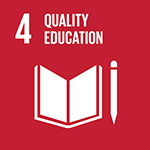SDG 4: Ensure inclusive and equitable quality education and promote lifelong learning opportunities for all

The approach of the Congress of Local and Regional Authorities is based on three key principles: achieving SDGs is the shared responsibility of all levels of government; local and regional authorities must have the necessary competences and financial autonomy to achieve the goals in their respective areas; citizens must always remain at the heart of the action.
The Congress encourages public authorities to make education accessible to all: free, equitable and of quality. It is particularly committed to promoting the inclusion and active participation of young people in civic life as a means of ensuring social cohesion and anchoring democratic principles in a society based on respect for human rights. This approach was confirmed by the adoption of the European Charter on the Participation of Young People in Municipal and Regional Life in 1992. The active participation of citizens in representative democratic structures and institutions is decisive for the legitimacy, credibility and functioning of democratic systems. The Congress work focuses on social rights, youth work, intercultural education and democratic citizenship.
The Congress adopted the following texts in relation to SDG 4:
-
REC 528 (2025) - The role of local and regional authorities in protecting and promoting social rights and fostering social development
-
REC 511 (2024) - The UN Pact for the Future: The essential role of local and regional authorities in global sustainable development
-
REC 473 (2022) and RES 481 (2022) - The future of youth in rural areas - responsibilities of local and regional authorities
-
RES 478 - Children and sustainable cities: guidelines and booklet for local and regional authorities
-
REC 450 (2021) and RES 463 (2021) - Youth work : the role of local and regional authorities
-
REC433 (2019) and RES442 (2019) - Social rights of young people: the role of local and regional authorities
-
REC 414 (2018) and RES 428 (2018) - Unaccompanied refugee children: the role and responsibilities of local and regional authorities
-
RES414 (2017) - Forever young? The role of youth policies and youth work at local and regional levels in supporting young people’s transition to autonomy and working life
-
REC 385 (2016) and RES 398 (2016) - Autonomy and borders in an evolving Europe
-
RES 387 (2015) - Voting at 16 – Consequences on youth participation at local and regional level
-
REC 376 (2015) and RES 386 (2015) - Bringing down barriers to youth participation: adopting a lingua franca for local and regional authorities and young people
-
REC 382 (2015) and RES 392 (2015) - Championing children’s rights in times of austerity: Local and regional authorities’ responsibilities
-
RES 390 (2015) - Trends in regionalisation in Council of Europe member States
-
REC365 (2014) and RES375 (2014) - Promoting diversity through intercultural education and communication strategies
-
RES332 (2011) - Education for democratic citizenship – tools for cities
The following thematic activities of the Congress are particularly related to SDG 4:
Congress has issued the following SDG 4 relevant publications:



